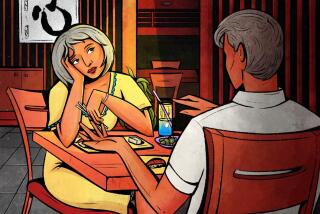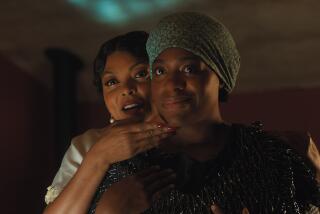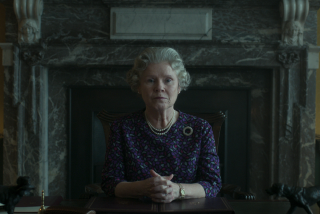Forgetting Their Place : THE PRINCESS AND THE PAUPER An Erotic Fairytale <i> by Gwen Davis (Little, Brown: $17.95; 242 pp.)</i>
- Share via
Gwen Davis’ new novel, “The Princess and the Pauper,” offers us the universal fantasy that we might change places with someone. Surely, everyone has dreamed of waking up one morning as another person--for instance, becoming Donald Trump or the Princess of Wales--but without losing your inward identity. How to accomplish this transposition? There is always the Walter Mitty temporary wish-fulfillment approach or the serendipitous look-alike and clothes switch. Davis has chosen the latter method and borrowed her framework from Mark Twain. However, with the publication of “The Prince and the Pauper,” Twain hoped to rise above his reputation as a humorist. Davis is content to be witty and funny and create a modern fairy tale complete with just about everything that ought to be in a modern fairy tale.
Davis’ heroines are Darcy (princess) and Shan (pauper). They resemble each other; and since the premise is that identity is only skin-deep and/or clothes make the person, they switch places. The real princess is bored to the limits of royal endurance, sexually deprived, and forced to find real life in magazines read while under the hair dryer. Shan, on the other hand, is not an unhappy pauper--or is ignorance bliss?
The plot is simple. Shan, yearning for a touch of the splendid, has purchased a lottery ticket for a chance to have tea with Princess Darcy, who is on a royal visit to Wales. Shan has even taken “tea lessons” from the local semi-bogus duchess. Although she is not the winner, Shan still meets the Princess. Destiny, you see, is not to be thwarted.
In Davis’ fantasy, the prince and princess had not lived happily ever before. In lieu of royal bliss, Princess Darcy is contemptuous of Prince Rodney’s less-than-firm nature. The common folk fare better. Shan, the happy housewife, has a successful marriage to the shale miner Tom. She cooks, cleans and provides sex on demand.
After the princess and the pauper switch places, Shan seems to have the easier time of it. Housewives have more experience in being adaptable. Still, Shan bids goodby to her hometown of Criccieth with tears in her eyes and the sounds of two quarrelsome blackbirds in her ears: “The wife was railing and squawking and screeching, and, much as the male tried to turn a deaf ear, he couldn’t avoid her. She pursued him, relentless. So it went, Shan supposed, marriage; no matter how low down on the evolutionary scale. She owed it to herself to see firsthand what it was like being married to a prince among men.”
Princess Darcy immediately has problems. She hardly knows her way around day-to-day living in southwestern Wales. She forgets to clean the fish before frying it, and as for the chicken: “What’s burning?” Tom said, as he came in the door.” But housekeeping skills aren’t everything, and Darcy soon discovers conjugal bliss with Tom. However, her newly acquired feelings are interrupted by the arrival of the actor Miles (Shan’s first love). Fairy tales have simple story lines but a lot of turmoil. Later, a sea monster named Darnall shows up.
Now too much fantasy is not necessarily a good thing, so Davis supplies us with a lot of modern references to hydrofoils, photo layouts, issues of Cosmopolitan, and skiing in Switzerland.
Mark Twain set his book in the undemocratic England of Edward VI. Davis has the kingdom of Perq, a Monaco-like country, also undergoing political difficulties. The chief villain is Quirin, a Libyan arms dealer. He plays the role of Perq’s Rasputin, the confidante to Queen Isabel. Queen Isabel, Darcy’s mother-in-law, is in sexual enthrallment to Quirin. This is a dutifully erotic fable with erotically sincere couplings and detailed debaucheries.
And having changed places, do the bogus princess and the imposter pauper wonder about their past lives? Here’s Shan: “Dear Tom. She hadn’t even thought about him, so caught up was she in her adventure. Her sweet, good husband, dismissed from the mind like a terrier sent to the kennel while the family went traveling.”
Complications multiply in a pastiche of the genuinely comedic and true overkill: an alcoholic king, treacherous court attendants, dungeons, and a performance of “Hamlet.” The characters are stereotypes. This is to be expected in a fairy tale, lest the reader become confused. Also, nothing is safe or sacred. This includes plastic surgery: “Only afterwards do they discover, to their great disappointment, that a nose is a nose is a nose.”
Yes, Dear Reader, the villain meets his expected end. Queen Isabel comes to her senses: “But each man kills the thing he loves: Women just write novels.” Fairy tales, however, have a finite life span. Novels sometimes seem to go on forever. At times we grow weary, and the bon mots pile up. Still, the story ends, and the heroes and heroines pair off with different people. Thus, this book concludes with the chilling thought of not a few modern fairy tales--namely, that people are perhaps truly interchangeable.
More to Read
Sign up for our Book Club newsletter
Get the latest news, events and more from the Los Angeles Times Book Club, and help us get L.A. reading and talking.
You may occasionally receive promotional content from the Los Angeles Times.







